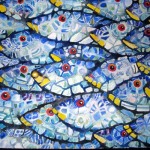 When I blogged regularly, which I did for six years, I felt more alive, more alert, more attentive to my life, and what God was doing in it. In Frederick Buechner’s phrase, I listened to my life.
When I blogged regularly, which I did for six years, I felt more alive, more alert, more attentive to my life, and what God was doing in it. In Frederick Buechner’s phrase, I listened to my life.
I have taken a six month blogging break, and the peril of blogging breaks (or writing breaks: ask Harper Lee or Margaret Mitchell!) is that you feel you have to write something substantial, beautiful, and meaty when you return to blogging …which seems daunting, and so you put off writing—and returning.
The cardinal rule for avoiding writers’ and bloggers’ block—and indeed for any endeavour—is to begin where you are, with something little and slight if need be.
So perhaps I should catch you up with a snippet from my life, and an insight stemming from it.
* * *
The country lane on the outskirts of Oxford, England which we live, unbelievably quiet and beautiful when we moved in over ten years ago, has changed its character as more people have moved in—“Traveller” families, as it happens. It has become noisier, less idyllic and scenic. The whole village was up in arms against “Travellers” moving in; there were public meetings and hearings; I was particularly troubled because they were moving onto a field adjacent to my large garden. But in prayer, I “heard” clearly that we were not to oppose them, so we did not; we ceased attending public meetings or lodging planning protests against them, much to our other neighbours’ mystification.
In early June, because of many and noisy neighbours in what had been a quiet and deserted lane, I realized that the time had come to move–from the countryside on the edge of Oxford, where I have happily lived for the last 11 years to the city, to North Oxford in particular. And we even had an offer to buy our house, phew!!
Why North Oxford? When I applied to study in Oxford as a student in the eighties, I felt a call, a leading to Oxford, and I have never felt a call to any other city. North Oxford is walking distance from my church, St. Andrew’s; from Oxford University where I am now on my second year of the German classes I am taking for fun; from the Ashmolean Museum; the superb Oxford Playhouse, friends, parks, the river, a good gym, yoga classes. I would be able to walk most everywhere.
North Oxford is, however, substantially more expensive than my country village on the outskirts of the city. It’s the most expensive area of the UK, outside of London!!
So…
* * *
Deciding to move has galvanized us. “God meant it for good.” We have owned a small business for almost ten years now, and we have started diligently and creatively expanding it to finance our move. So that’s a definite blessing that’s come from this decision.
Many, many, years ago, I felt a longing, to write a memoir. A call? A desire, a longing, a call–they are all intertwined. God reveals his call on our lives through the desires, gifts and experiences he has given us. But the book turned out to a bigger, longer project than I had visualized, and early rejections of the proposal at a hassled, overwhelmed time of my life broke me. Temporarily.
But writing this book was a mysterious call, all right, something that perched on my shoulder, and I didn’t feel free to move on to anything else until I had completed it. So I did not…move on to something else… nor complete it.
The tale has tragic overtones now, but God who loves good stories can make dark plot twists like Joseph-in-the-well-and-dungeon and Good Friday spiral upwards and morph into gold, into Easter Sunday
Anyway, when I decided to move because of my new and noisy neighbours, I swiftly realised that moving was out of the question until I had finished this book. Moving can be stressful, especially in middle age… People can lose their health, their peace and their papers…
So I decided to finish my book before I moved. Realising that living next door to my noisy neighbours was unsustainable in the long run galvanized me to do what I had always wanted to do for years, get some momentum on the book–which has been a great joy. How relieved, how delighted I will be when the book finally gets finished.
* * *
So here I am, writing slowly but steadily.
Funny thing… In June 2016, I was convinced that I was burnt-out. Our daughter Irene, our last nestling, didn’t want to go on holiday over the February or the June half-term breaks because of her mocks and A-S exams, and all I could think of was how tired and burnt out I was, and how I needed a long, active holiday, and to walk many miles a day to exorcise a cobwebby from my mind, and flood it again with oxygen and ideas.
But then an offer came to buy my house, and I decided to sell the house, and move, and to finish my book before I even contemplate moving. With that fresh hearing of the ancient call came a new momentum, and energy descended from the heavens.
I came across this quote recently, “Burnout is more often caused by purpose deficiency than vitamin deficiency.”
My burnout lifted, just like that.
I do not make bucket lists…I see God as full of kindness towards me, with open hands towards me, full of gifts, and am okay with accepting the gifts he pours out. But if I were to make a bucket list… well, finishing and publishing this book would be one of the few things in that bucket. And circumstances have now given me a sort of deadline.
* * *
Years ago, my mentor suggested that I have a writing goal. But incredibly, I didn’t then know how to set goals. You know I would hope to write two chapters, but instead wrote a teeny bit of one… and then what?
So this time, I started really, really ridiculously small, since I was adding a new thing–finishing a book–to a life already full with blogging, parenting, exercising, German classes, gardening, house-running, church, small group, writers’ group, etc. etc. I set the timer for 5 minutes, and decided to write 20 words minimum. The next day, I went for 40, then 60, and now I am at 2300 words a day, new or revised. I keep track of the words I’ve missed on busy days, and try to make up on the days when writing feels like flying (which are not that frequent, sadly).
So this is the second/third draft of the book, revising is not the most scintillating thing, but getting the book finished will be scintillating, so I try to sit down, revise 2300 words, do some make-up words, and then I’m all done for the day.
* * *
A couple of things that are helping me. I start my writing with reading, to take the revision process more joyous. (Currently reading One Man’s Meat, E. B. White’s memoir of country life which I have just decided is not for me, and Goodbye to All That, Robert Graves’ horrifying memoir of his service in the first World War).
I am using the Pomodoro technique, work for 25 minutes, and then take a 5 minute break to tidy and declutter, or bounce on my trampoline for 1000 steps, and then back to work. 25 minutes is a maddeningly short work session, but according to Britain’s NHS, one should take an active break from sitting every 30 minutes: “excessive sitting slows the metabolism – which affects our ability to regulate blood sugar and blood pressure, and metabolise fat – and may cause weaker muscles and bones. Essentially, the body is ‘shutting down’ while sitting and there is little muscle activity.”
I am using “Freedom,” software which blocks the entire internet for the short time I am reading and writing. Divided attention destroys productivity.
I have discovered that a three mile walk through a park or by a river resets my tired mind and floods it with oxygen again; I don’t necessarily need a week or a weekend away, though they are wonderful.
I have been influenced by a book I am reading by Harvard psychiatrist John Ratey, called “Spark: How Exercise will Improve the Performance of Your Brain,” about how running, lifting weights, yoga, dance and sport can spark a measurable improvement in cognitive ability… help you think more clearly, read faster and concentrate longer… essentially make you smarter. I have certainly found it to be true. I am taking yoga classes, and lifting weights, which helps me concentrate for longer, feel more alive and happier, and sleep better.
* * *
Take away? If you are listless, bored, burnt-out and aren’t getting anything much done, re-align yourself with God. Seek his marching orders for the hour in front of you, the day in front of you, the year. Each of us has been created for a purpose, and is intended to be a bright spot in the jigsaw, the mosaic that God is working on. Ask him to reveal the purpose he has for you in the coming year, or years, and then beaver away at it. Having a purpose and focussing on it has cured cancer patients, as we’ve all anecdotally heard; given the dying a new lease of life; lifted depression; helped people achieve more than they ever imagined possible.
What is the next purpose God has in mind for your one and precious life? Aligning yourself with the Father and working on it will fill your life with excitement and energy again.
Love, Anita, tortoising, and sometimes haring, away on the book she has always wanted to write.
















